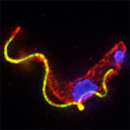Cytosolic NADPH Homeostasis in Glucose-starved Procyclic Trypanosoma brucei Relies on Malic Enzyme and the Pentose Phosphate Pathway Fed by Gluconeogenic Flux
Allmann et al. (2013); J Biol Chem, 288:18494-18505 (Boshart lab)
21.06.2013

Allmann S, Morand P, Ebikeme C, Gales L, Biran M, Hubert J, Brennand A, Mazet M, Franconi JM, Michels PA, Portais JC, Boshart M, Bringaud F.
J Biol Chem. 2013 Jun 21;288(25):18494-505. doi: 10.1074/jbc.M113.462978
abstract
All living organisms depend on NADPH production to feed essential biosyntheses and for oxidative stress defense. Protozoan parasites such as the sleeping sickness pathogen Trypanosoma brucei adapt to different host environments, carbon sources, and oxidative stresses during their infectious life cycle. The procyclic stage develops in the midgut of the tsetse insect vector, where they rely on proline as carbon source, although they prefer glucose when grown in rich media. Here, we investigate the flexible and carbon source-dependent use of NADPH synthesis pathways in the cytosol of the procyclic stage. The T. brucei genome encodes two cytosolic NADPH-producing pathways, the pentose phosphate pathway (PPP) and the NADP-dependent malic enzyme (MEc). Reverse genetic blocking of those pathways and a specific inhibitor (dehydroepiandrosterone) of glucose-6-phosphate dehydrogenase together established redundancy with respect to H2O2 stress management and parasite growth. Blocking both pathways resulted in ∼10-fold increase of susceptibility to H2O2 stress and cell death. Unexpectedly, the same pathway redundancy was observed in glucose-rich and glucose-depleted conditions, suggesting that gluconeogenesis can feed the PPP to provide NADPH. This was confirmed by (i) a lethal phenotype of RNAi-mediated depletion of glucose-6-phosphate isomerase (PGI) in the glucose-depleted Δmec/Δmec null background, (ii) an ∼10-fold increase of susceptibility to H2O2 stress observed for the Δmec/Δmec/(RNAi)PGI double mutant when compared with the single mutants, and (iii) the (13)C enrichment of glycolytic and PPP intermediates from cells incubated with [U-(13)C]proline, in the absence of glucose. Gluconeogenesis-supported NADPH supply may also be important for nucleotide and glycoconjugate syntheses in the insect host.

